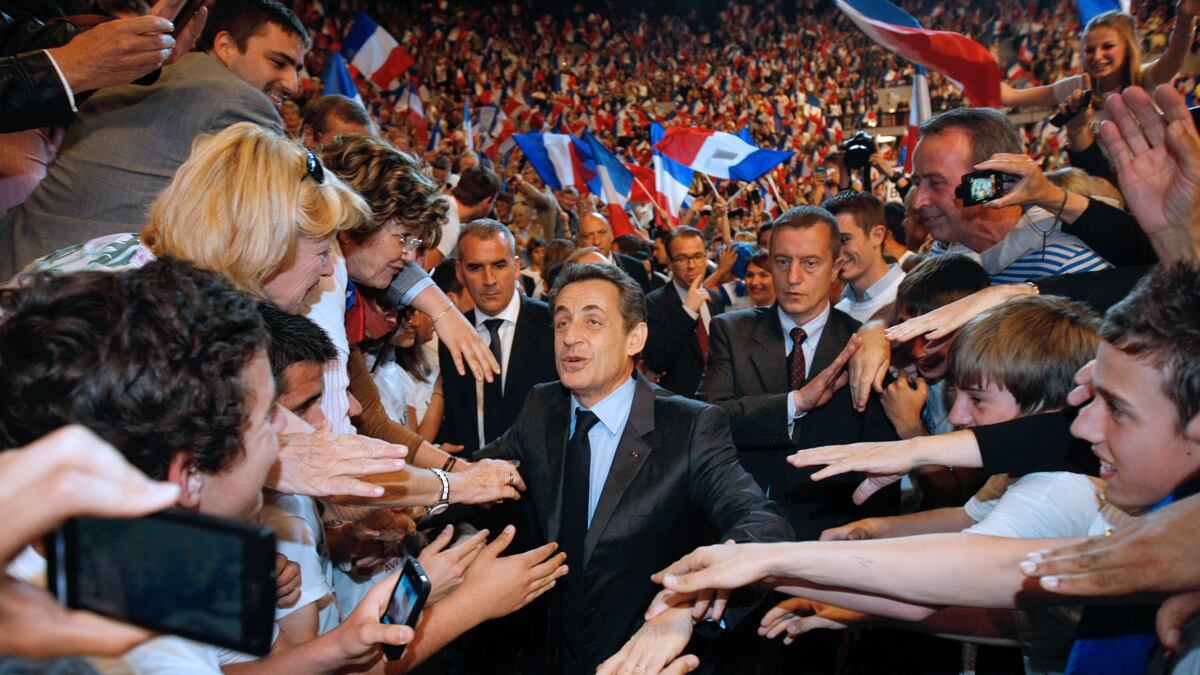As France elects a president Sunday, the embattled incumbent isn’t going quietly. Throughout his career, including a five-year term at the top, Nicolas Sarkozy has been the political incarnation of the Energizer Bunny. Hyperactive, unstoppable, he’s a twitching ball of nervous energy, forever beating the drum of his latest big idea.
Sarkozy, 57, has built up a reputation as a wily and ferocious campaigner, one of the savviest political minds of his generation, over 35 years in politics. A master of the coup d’éclat, of turning enemies into allies or, once they serve their purpose, allies into prey. It is that esteem of his tactical genius—perhaps alone—that has fed steady suspense into the campaign for his reelection. Despite years of abysmal approval ratings. Despite hundreds of polls that not once have given him the lead ahead of Sunday’s runoff. Despite the 14 of 27 European leaders evicted in three years, through a crippling economic crisis. The wise have never counted Sarkozy out: he can always pull that rabbit out of his hat. He can win at will. He’s that good.
François Hollande, au contraire, has been Mr. Low Expectations, seen as soft, compared variously for years, in his own party and beyond, to a jiggly caramel custard dessert called Flanby, to marshmallow, to those round-bottomed clown toys that wobble and bounce back up with vacuous smiles when punched. Six months ago, Sarkozy’s education minister, Luc Chatel, likened Hollande to Babar, the affable king of the elephants in the famous childrens' books. Chatel explained, “It’s one thing to be nice, to have a sense of humor, to put folks to sleep during the Socialist primary. That’s not what people expect of a presidential candidate.” And so Hollande—in reality every bit the political animal Sarkozy is—has plodded along under the radar.
The trouble is, Sarkozy came to believe the hype himself: that at any time he could deliver a master class to the unheralded Hollande, the so-called candidate by default who won the Socialist nomination after one-time favorite Dominique Strauss-Kahn’s ignominious demise. But the trap of misplaced expectations clouded Sarkozy’s political Spidey sense. And if it hasn’t cost Sarkozy the election (not yet, at least), it has left him lagging, fighting from behind, desperately leaping for favor between virtually irreconcilable electorates. On Sunday, French voters will decide whether Sarkozy can pull one last flop-eared victory out of his hat. Or let the ultimate tortois-and-hare campaign end just like the fable.

Take Wednesday night’s heated TV debate between the candidates. Sarkozy had reportedly been promising he’d “explode” the “loser” Hollande when he got the chance, taking the Socialist’s anti-Sarkozy pledge to be “a normal president” for weakness. In the event, Hollande was combative, never dominated by the feisty incumbent, and poised to call him out on fibs. Sarkozy, meanwhile, became increasingly agitated, even throwing out the name of Strauss-Kahn (“a stink-bomb,” said one French critic), in a desperate move that fizzled. When a brash Hollande launched into a three-minute sequence in which he began 15 sentences with the words, “I, president of the republic, will ...” Sarkozy puzzled observers by not interrupting once, as if stunned. After the contest, Sarkozy seemed to tweak his appraisal of his rival. “I’m not the only one who found him aggressive. He’s like that. It’s his personality,” he scoffed. Six post-debate polls gave Hollande the edge on most questions.
The tortoise Hollande, early on in his bid to become the Socialist nominee, had only two reporters on his beat. In November 2010, he polled at 3 percent for the role, well behind Strauss-Kahn (32 percent). (Hollande wasn’t even France’s preferred choice between his own kids’ parents. The defeated 2007 candidate Ségolène Royal, his former romantic partner and mother of his four children, was polling at 10 percent for a repeat presidential run.)
Now Hollande has officially been campaigning nonstop for more than a year. He declared his candidacy for the Socialist nomination in March 2011. On May 10 last year, three days before the Manhattan arrest of Strauss-Kahn would rock French politics to its core, Hollande told reporters that opportunities are earned: “The most beautiful victories are those that, at first, don’t have a chance.” He would beat five opponents to win the primaries in October 2011 and roll out his 60-point presidential platform in January 2012. On April 22, he became the first challenger ever to top an incumbent in the first round of a French presidential election, and he heads into Sunday’s runoff as the favorite.
Sarkozy, meanwhile, hadn’t planned to declare his bid for reelection until March, a month before the first round. Poor poll numbers and insistent associates persuaded him to move that date up, to Feb. 15. But he didn’t bother rolling out a platform until April 5, just after stepping off the red eye from an Indian Ocean trip, burying it before the long Easter weekend.
Challenging from behind, Sarkozy’s campaign has been nasty, brutish, and short. Hollande compared him to “a runner who has fallen behind and is trying to catch up by grabbing the jersey of the man ahead of him.” Sarkozy has looked to repeat his 2007 feat of poaching far-right support, while paying lip service to the centrists he needs. As a result, after Marine Le Pen made meat slaughtered by Muslim ritual a campaign issue, Sarkozy went from dismissing the matter to arguing it was French voters’ top worry. After initially playing the good European in a TV interview at the Elysée Palace alongside German Chancellor Angela Merkel, Sarkozy switched tacks and pledged to unilaterally pull France out of the Schengen Agreement that allow for visa-free travel in Europe if his demands weren’t met.
When the far-right National Front’s record first-round score (17.9 percent) shot down his strategy—and his own score made clear he’d need massive centrist and far-right support to win on May 6—Sarkozy chose to turn his far-right rhetoric up a notch. In a new flurry against the lazy unemployed and the “assisted,” Sarkozy pledged to celebrate “real work” in a counterrally to the traditional union marches on May 1. In a single speech at another rally in Toulouse last weekend, Sarkozy used the word “border” 80 times. One of his new campaign ads shows Arab-looking men being physically searched by authorities wearing protective facemasks. A Sarkozy voiceover explains that integration no longer works because too many immigrants have come to France. (This despite Sarkozy himself framing French immigration policy for the last decade.)
The transparent tactics appalled some centrists and amused far right-wingers. At her National Front’s annual gathering on the Place de l’Opéra in Paris, far-right firebrand Marine Le Pen mocked both of the presidential finalists for coveting her voters. “How do you feel about going from being the idiots who vote Marine Le Pen to the arbiters of the presidential election? How do you feel about changing status from xenophobic racist fascists to French people with real concerns that we must speak to?” she chided, to cheers. But she reserved particular scorn for Sarkozy, who was booed heartily at every mention, calling his “belly dance” to seduce her voters “supreme electioneering fraud.” Le Pen, who has more to gain if Sarkozy loses and his party disintegrates, told supporters she would cast a blank ballot on Sunday.
Meanwhile, centrist leader François Bayrou, a more popular figure than his 9.13 percent first-round score suggests, said on Thursday that he would vote for Hollande, a historic break in a decades-old centrist/right-wing alliance. Bayrou said he disagreed with Hollande’s economic program. But he slammed Sarkozy’s “violent” line between the two presidential rounds, his “obsession with reestablishing borders,” and his “race with the far-right.” He said it contradicted moderate values, centrist and right wing alike. “The obsession with immigration in a country like France, to the point of presenting in his campaign ad a ‘Customs’ road sign written in French and Arabic. Who does not see what clashes, what clashes between French people, that will lead to?” Bayrou said in a press conference broadcast live on France’s all-news networks.
In the final days of this campaign, the atmosphere has only gotten uglier. As Sarkozy blasts the media—some of which have accused him of corruption or compared him to the Nazi-collaborating Marshal Philippe Pétain—a number of the faithful at his rallies have taken their frustrations out on reporters, who in some cases have been attacked, insulted, spit at, or hit with a bottle. At his last major rally on Thursday night in far-right friendly Toulon, Sarkozy accused the left of “no longer loving the Republic.” And he launched into a new après moi, le déluge routine. “[When the Socialists were elected] in the 1980s, it took two years for the situation to become untenable. Today, it would take two days,” he declared, extending both arms for emphasis. “Two days of illusions, for years of suffering! Two days that sing, for years of sacrifice! Two days of lies, and years to pay the bill!” If you’re counting, that means it is all downhill from Tuesday if Hollande wins.
Hours before the end of this heated French campaign, the very last numbers show the undecided deciding and the gap narrowing ahead of Sunday’s vote. Hollande still enjoys a wide lead in the polls, between four and seven points. Ironically, Sarkozy’s legend as a political whiz might work to get out the vote for his slow and steady rival, with nervous Hollande supporters as convinced as the pundits that the jackrabbit incumbent can’t be counted out until the count is in. Stay tuned for Sunday.





